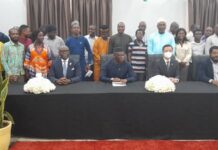The Mayor of Freetown Mayor Aki-Sawyerr has participated in the inaugural Forum on Global Resilience by the Adrienne Arsht-Rockefeller Foundation (“Arsht-Rock”) Resilience Centre. The event was curated to explore proven, innovative, and scalable solutions for building resilience to extreme heat and other climate change challenges.
“Extreme urban heat is often called the “silent killer” because globally it kills more people than any other climate-driven weather event in an average year, and yet its deadly nature is little known or understood. Cities are ground zero for the health, social, economic, and physical consequences of extreme heat” She said.
She expressed that the forum was opened by Ms Adrienne Arsht, Founder, Adrienne Arsht-Rockefeller Foundation Resilience Center and it was directed by Senior Vice President Kathy Baughman McLeod.
She continued that With Elizabeth Yee, Executive Vice President of the Rockefeller Foundation as the moderator of our panel, Eugenia Kargbo, Freetown’s Chief Heat Officer and I spoke about the work FCC is doing to better understand and address extreme heat in our city. In collaboration with community stakeholders such as Councillors, CDMCs and CBOs under the #FreetownTheTreeTown campaign and with government agencies and partners such as the Sierra Leone Meteorological Agency, EPA, NDMA, UNDP, Sierra Leone Red Cross, SLURC and with funding support from the National Oceanic and Atmospheric Administration, heat mapping and air quality measurements will start in Freetown within the next two months to identify the urban heat islands and hot spot areas.
“Simultaneously, with financial support from Arsht-Rock, we will commence the construction of heat repellent market shades in 3 open air street markets (Calabar Town, Portee and Bombay Street) with plans to expand on these as quickly as possible so as to provide much needed relief for women who are among our most vulnerable population groups. (Below are CGI images to illustrate the market shades).
We are grateful for our partnership with the Arsht-Rock Resilience Centre as we continue to collaborate and explore opportunities to finance more heat resilient interventions in our city.
At a time of major multi-sectoral challenges, it is important for us to keep making tangible improvements in the lives of our residents, one step at a time”.
Sierra Leone Parliament observes second open day
The Parliament of Sierra Leone has observed its second Open Day at State Hall of Parliament Building in Freetown on the theme: “bringing more people closer to Parliament”. The event was also broadcast on satellite in Bo, Makeni and Kenema City Councils. Academics, Think Tanks, Citizens, Councilors, Traditional Rulers, Development Partners, Civil Society Organizations, Students, Pupils, Ministers of Government and Members of Parliament were all in attendance in Freetown and provincial headquarters.
The aim of the Parliament Open Day is to make Parliament open, accessible, transparent and accountable to the people of Sierra Leone, and it will run from the 5-7 May 2022 with support from Parliament, European Union and other partners. The Open Day will also promote a culture of openess and information sharing on the operations of Parliament and will aslo give citizens the opportunity to directly engage their MPs and ask questions on their roles and responsibilities in the overall governance of the country.
In his welcome remarks, the Deputy Speaker of Parliament, Hon. Segepoh Soloman Thomas said the overall objective of the Parliament Open Day was to showcase the Parliament of Sierra Leone and make it open and accessible to the public and to create better understanding about what constitutes its core mandate of the supreme legislative body in Sierra Leone. He emphasized the need for making Parliament accessible to the people of Sierra Leone in order to promote citizens’ participation and understanding about the legislative process in the country. He also said that on completion of the three days Parliament Open Day, it would increase public understanding about the workings of Parliament, and spoke on the need for an open, accountable, and a transparent Parliament.
He appreciated the work of Parliament, Staff and donor partners for supporting the Parliament of Sierra Leone in its strides for being a responsive and an accountable Parliament to the needs and aspirations of the general citizenry.
Speaking on behalf of the Leader of Government Business, the Deputy Leader of Government Business, Hon. Bashiru Silikie appreciated the work of the Fifth Parliament of Sierra Leone and underscored the working relationships between CSOs and Parliament. “The Leadership of Parliament in 2021 signed a memorandum of understanding with 52 CSOs with a commitment to making the work of Parliament more open, inclusive and more participatory with regards to legislation, representation and oversight.
Leader of NGC, Hon. Kandeh Kolleh Yumkella who spoke on behalf of the Leader of the Opposition thanked the Staff of Parliament for organizing the Parliament Open Day and underscored the need for an open Parliament in a democratic dispensation. He praised students, Civil Society Organizations, Development Partners present and spoke on the roles and responsibilities of Parliament, relative to legislation, representation, and oversight. He also spoke on the need of holding duty bearers accountable for the development of the country.
Representing the Foreign and Commonwealth Office, Kobi Bentley, Development Director commended Parliament for organizing the event with the view of promoting a culture of openess and information sharing on the workings of Parliament to the citizens through its “Parliament Open Day”. She also noted the bilateral relationship between Sierra Leone and the United Kingdom such as development assistance and cooperation between the two countries through Commonwealth Parliamentary Association amongst others.
Head of European Union Delegation to Sierra Leone, Ambassador Manuel Muller appreciated the Leadership of Parliament for the initiative to bringing the people to the doorstep of Parliament. He spoke on the EU support in Sierra Leone aimed at strengthening infrastructural development, good governance and democracy in the country. Speaking on technical support to the Parliament of Sierra Leone he mentioned capacity building of MPs and Staff, improvement of the website, the Bo Declaration, and development of a strategic plan and a communication strategy amongst others. He also said that the EU would continue to work with the People of Sierra Leone and promised to work with the Government of Sierra Leone in the promotion of gender issues in politics.
Speaking on e-Parliament, ICT Director in Parliament, Joseph Conteh said the e-Parliament was to make the work of Parliament effective and efficient by going paperless through digitization. He spoke on the five components of the e-Parliament and their significance to the development process of Parliament. He commended the EU for supporting the process and pleaded for more assistance in the digitalization of the Parliament of Sierra Leone.
Following his presentation, the Deputy Speaker and the EU Ambassador launched the e-Parliament.
Speaking on behalf of the Clerk of Parliament, with presentation of the Sessional and Financial Report, Madam Director-General, Finda Findosia Fraser said the Annual Summary Report for 2021 under review was “embracing change”, and spoke on the various reforms in the management of the Parliament of Sierra Leone under review. Madam DG highlighted the successes of the Parliamentary Service Commission and the Parliamentary Service in its development strides on service delivery. She spoke on the performance-related goals of the Parliament of Sierra Leone relative to strengthening institutional capacity, enhanced legislative capacity, strengthened oversight capacity, representation and relationship with citizens, and resource mobilization. She also commended International Partners and the Staff of Parliament for their assistance and support to the Parliament of Sierra Leone.
Making his keynote address on behalf of the President, Deputy Minister of Information and Communications, Solomon Jamiru Esq. commended the work of the Sierra Leone Parliament relative to legislation, representation, and oversight. He said Parliament Open Day was a reflection of the work of the Parliament of Sierra Leone and encouraged all to make a difference in their public and private work for the development of the nation.
He said the business of Leaders was to govern and advised them to govern well.
He highlighted the responsibilities of the three Organs of Government toward the socio-economic development of the state.
He used the occasion to highlight the accomplishments of the government in the areas of education, media reforms, judiciary, and other sectors of governance. He said as a Government they were thinking holistically for the development of the state and cheered the Leadership of Parliament and requested for unity in diversity in the transformative drives of the governance of the state. He spoke on the abolition of the death penalty and a repealed of Part V of the Public Order Act of 1965 which criminalized libel amongst others.
Director of Parliamentary and Public Relations Department in Parliament, Sheku Lamin Turay moderated and served as Master of Ceremony.
A tour to the exhibition booths climaxed the first-day of the opening session of the Parliament Open Day which will be followed by side events on Friday and Saturday on various topics including gender, media, budgeting, and partnership and CSOs engagements amongst others.
Information minister joins UNESCO to celebrate world press freedom day
IPDC’s Media Viability case studies featured at UNESCO’s World Press Freedom Day global commemoration. Eleven inspiring initiatives to promote media development were shared with delegates at the UNESCO World Press Freedom Day conference at Punte del Este, Uruguay.
After the pandemic, building back a stronger media, Reading IPDC’s new book are Sierra Leone’s Mohamed Rahman Swaray, Minister of Information and Communications of Sierra Leone; Mamoud Tarawallie, BBC Media Action; and Yeama S. Thomson, Director General, Sierra Leone News Agency. They were at UNESCO’s World Press Freedom Day global conference to announce their new roadmap for media viability. The cases are published under the title of “After the pandemic, building back a stronger media”, compiled by media expert Larry Kilman for UNESCO’s International Programme for the Development of Communication (IPDC).
With many news media organizations struggling as businesses, their very survival rises to the level of a major threat to media freedom.
The case studies cover: Latin America: strengthening entrepreneurial journalism
Indonesia: where the advertising model for media still works Chile: A payment platform helps independent and local media gain revenue Lebanon: Making a successful transition from print to digital Europe and Africa: Advocacy in all shapes and sizes South Africa: Community media take on a new role Global: Protecting the independence of public service media Brazil: Fact-checking emerges as a business strategy Pakistan: How the Jang Media Group emerged from the pandemic
The Caribbean: Cross border collaboration Global: A fund for new approaches to media development
The publication complements UNESCO’s recent Policy Brief, “Finding the funds for journalism to thrive”, launched at World Press Freedom Day on 3 May, also with IPDC support. (see story here).
The two publications respond to the twin challenges of digital disruption and the global pandemic, and their insights enriched the session titled “Media Viability: What Can Be Done?”of the World Press Freedom Day commemorations.
The outputs are part of a larger UNESCO collaborative initiative to strengthen media viability that also includes research, consultations, knowledge sharing and best practice resources to help independent news media ensure their future sustainabilty.
The 3 May panel in Uruguay examined the wide array of policy recommendations put forward in the policy brief, which provides 22 highly practical recommendations, especially in terms of urgent change in policy and practice by governments, internet companies and news media.
Not all of the policy recommendations would work in every market and should be tailored to local conditions, the panelists noted. However, changes at global level are also needed to have more and better journalism on a large scale, said panelist Marcelo Rech, President of the Brazilian Newspaper Association (ANJ).
Other speakers included: Ambassador Anna Brandt, Chair of UNESCO’s International Programme for the Development of Communication (IPDC); Danielle Coffey, Executive Manager, News Media Alliance, USA; Dr Agustin Espada, Quilmes National University, Argentina; Paul Deegan, President and CEO, News Media Canada; Lic. Luis Ajenjo, President, Radio Cooperativa de Chile and Working Group on ICTs of the IAB; and Mijal Iastrebner, Journalist and co-Founder of Sembramedia




































